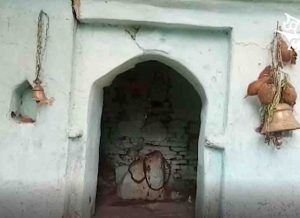A temple, a woman, and an entire village in a tizzy
In a man’s world like ours, there is enough we tell girls not to do. More often than not, these restrictions tend to become accepted, subliminal truths – in the name of tradition, superstition, they get solidified with the passage of time. One such dictum has been going on uninterrupted in Muskara village of the Hamirpur district of UP through the decades. It took one “unaware” woman to violate it – which is when all hell broke loose.
No woman has been allowed to enter the temple in Muskara village ever since its inception, and this rule has been observed strictly by the residents of Muskara for as long as they can remember. No one has ever questioned it, and on being asked, are quick to rationalise it – it is because women are not pure, is how one woman puts it. “This is something we have seen all our lives – it is not as if we are introducing this today out of the blue,” adds Kallu, helpfully.
In the last week of July, however, the local MLA Manisha Anuragi, broke with tradition, albeit unknowingly. Anuragi, a dedicated lawmaker, was in Muskara in relation with certain construction work that had to be undertaken there. On seeing the temple, she went in to pay her respects – oblivious to the “blasphemous” act.
Soon after, the village was in a tizzy, trying to reverse this sacrilegious deed so as to not anger the Gods. The temple priest, Dharam Muni Maharaj, who was absent on the day of Anuragi’s visit, was appalled at the events of the day. “There were so many villagers with her, all of whom were aware of this rule. But I don’t know what came over them, whether they were scared or shy, but no one told her that she simply cannot and must not enter. But once it became tainted, I had to purify it.” He rushed into action, and what followed was a staggering journey of so called “purification”. The statue of the temple was carried all the way to Allahabad so as to be cleaned in the holy Ganga, and a variety of offerings consisting of curd, sweets and milk was offered to the Gods for their forgiveness.
When we met with Anuragi, she seemed dismayed at the outrageous reaction to her harmless act, “It is not wrong to visit a temple. I had no clue about this rule, and none of the villagers accompanying me – which included women as well – informed me either. Had I known about this, I’d probably have hesitated.”
The “Hamirpur temple” story turned into viral material over the next 48 hours, even though forbidding women from entering places of worship, is not unheard of in our country – a rather precarious situation, with equality before the law on one side and the freedom of religion on the other, both fundamental rights enshrined in our Constitution. Take Haji Ali for example, the famous mosque that sits majestically on the Arabian Sea along the coast of Mumbai, which prohibited the entry of women into its inner sanctum until it was finally allowed by the Bombay High Court, to the extreme displeasure of the religious leaders. Similarly, Maharashtra’s Shani Shingnapur temple saw women’s rights activists trying to force their way in following a PIL challenging the bar on entry of women into its inner sanctum.
The reason cited for prohibiting women’s entry into temples and other sacred spaces, is often menstruation – a classic case of sex and biology being used to perpetuate gender-discrimination. This is the case with the Lord Ayyappa Temple of Sabrimala as well as the Patbausi Satra of Assam, both of which have long kept women out to preserve their purity. The explanation given by the Lord Kartikeya Temple of Pushkar is apparently more magnanimous – that the celibate God of the temple curses women instead of blessing them, and thus they are not permitted to enter for their own sake.
Even as the pradhan of Muskara village, Om Prakash denies that the purification ritual was carried out as a result of Anuragi’s visit and claims that it was already on the agenda – part of the temple’s calendar, the local police has sprung into action. When we approached the C.O. of Hamirpur district, Abhishek Yadav, to hear his views on the matter, he seemed irked at just about everything relating to the incident. “These are simply anti-social elements, who spread such orthodox views and misguide others. We have warned them about this in the past as well. And once things have calmed down a little, we shall initiate a police inquiry and also legal proceedings if necessary.”
Meanwhile, Anuragi, who won the local elections for the first in 2017 and is a newbie in the public sphere, has since apologized for her act. She finds herself slightly baffled at the unfolding of events, but mostly enraged, “There seems to be a problem with only women. They spread rumours like women entering will defile the temple and make it impure, which is completely baseless and untrue. Our society has come a long way from such a mentality today.”
This Khabar Lahariya article first appeared on The Wire.


